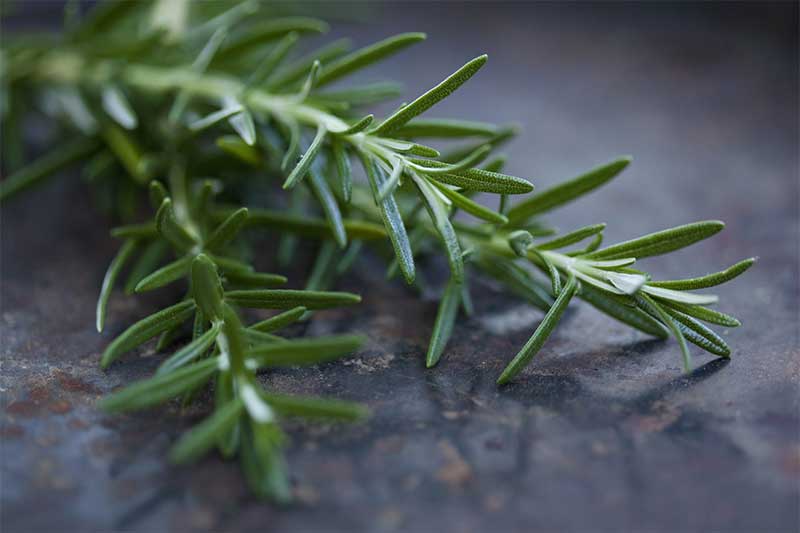Growing culinary herbs on your balcony, backyard, or even your windowsill can be a great way to incorporate them into your cooking creations. Cultivating your own is rewarding in its own right — from watching your effort unfold from the sprouting of the seeds to clipping leaves to complement a dish. There’s an added bonus: Many herbs are beneficial to the immune system. Using these flavorful and aromatic herbs can give an extra oomph to a meal, as well as your health.
Some herbs are overall immune boosters, while others can help reduce anxiety, stress, tension, and even lift our mood. Reducing stressors or minimizing the effects on your body is equally important in keeping your immune system strong, healthy, and alert.
These six herbs are easy to grow from seed or from a starter plant, and they require minimal care. In a short time, you’ll be able to reap the rewards both for your palate and your well-being.
1. Basil
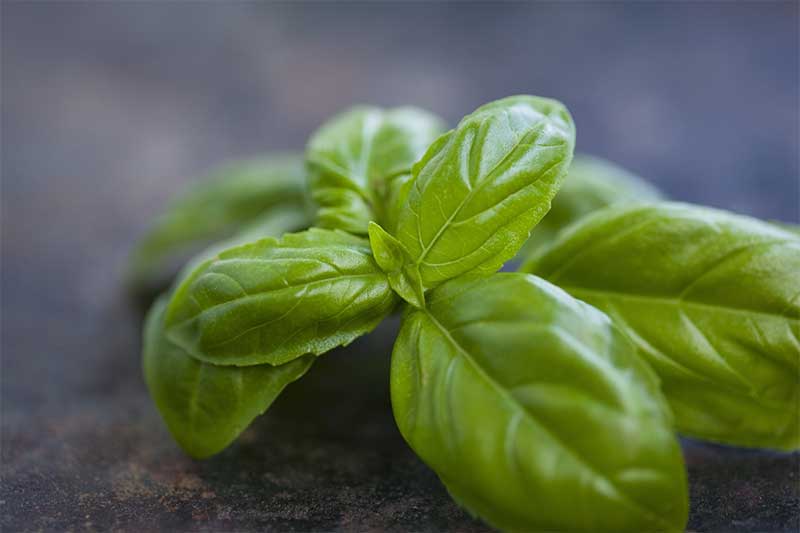 |
| CREDIT: JUDITH HAEUSLER/GETTY IMAGES |
Why It’s So Good: Basil, often referred to as Sweet Basil, aids the digestive and nervous systems. If you’re dealing with anxiety or stress, it can boost your energy and help release tension. With its antibacterial properties, basil can help ward off infections and colds, too.
Tips for Growing: Basil needs a lot of sunlight and flourishes in warmer climates. It can be tricky to grow in cooler areas or if it gets too much shade, so keep this in mind when choosing a location. You can sow seeds when soil temperatures are at least 50°F, or start indoors. You can also buy starter plants if you prefer.
Part Used: Leaves
How to Use: Use fresh basil on pizzas, pasta, salads, sandwiches, and sauces (add basil at the very end so it doesn’t lose its flavor). You can also make your own pesto sauce.
Recipe Idea: Make a basil pesto for smearing on sandwiches, dolloping on pasta, and more.
2. Oregano
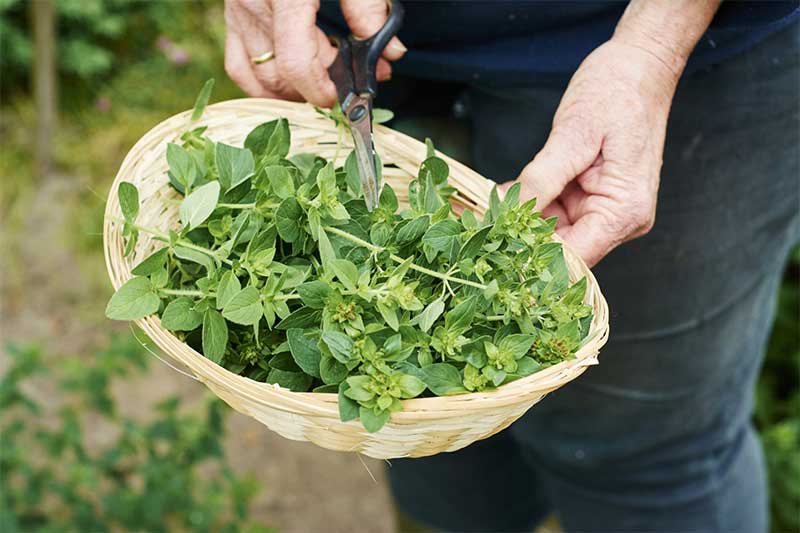 |
| CREDIT: WESTEND61/GETTY IMAGES |
Why It’s So Good: Oregano has antiseptic properties, which are beneficial for fighting off respiratory infections and digestion issues. Oregano is also useful in reducing nervousness and irritability caused by tension and anxiety.
Tips for Growing: Sow seeds directly into a flat tray or container with small holes for drainage. Seeds take around five to ten days to sprout. Oregano grows well in most climates and likes plenty of sunlight.
Part Used: Leaves
How to Use: Oregano is a great seasoning to add to meats, salads, sauces, and soups.
Recipe Idea: Oregano shares the spotlight with several other fantastic herbs in Chef John’s Grilled Garlic and Herb Shrimp.
3. Rosemary
Rosmarinus Officinalis
Why It’s So Good: Rosemary helps activate the circulatory system and can ease indigestion. If you’re feeling down or depressed, it’s known for increasing your spirits because of its antidepressant properties. Sometimes rosemary is used as a remedy to alleviate headaches.
Tips for Growing: Rosemary is a hearty shrub that grows well in containers or directly grown in the ground. You can grow from seed or buy a starter plant. Though rosemary prefers warmer temperatures, it does well in most climates. Make sure wherever you plant it, there is sufficient sunlight.
Parts Used: Leaves and flowers
How to Use: Rosemary is typically used as a rub for meats and for roasts. It’s also used in baking, including bread, crackers, and even cookies. Rosemary shortbread cookies, anyone?
Recipe Idea: Rosemary complements the grilled flavor on these Rosemary Ranch Chicken Kebobs.
4. Sage
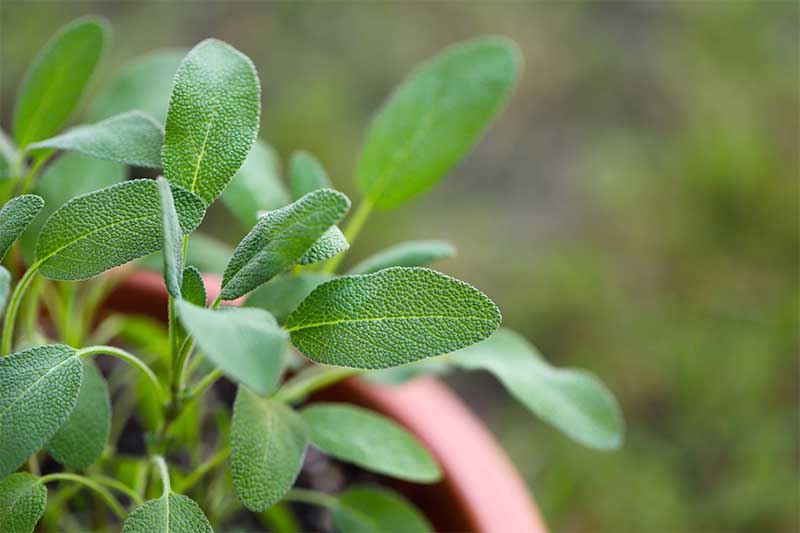 |
| CREDIT: DANIELA DUNCAN/GETTY IMAGES |
Why It’s So Good: With astringent and antiseptic properties, sage is great for warding off infections, colds, and flu. Sage serves as a good digestive aid and relaxes the nervous system.
Tips for Growing: There are over 500 varieties of sage, but the most prolific garden variety is common garden sage. Sage loves the sun and warm weather. If given the space and right conditions, the herb will grow into a decent size bush, so you’ll want to plant accordingly. Buying a starter plant or taking a cutting from another sage plant is ideal since sowing from seeds can be difficult.
Part Used: Leaves
How to Use: Add to meat rubs, sauces, soups, and stuffings.
Recipe Idea: Sage leaves get a starring role in lemony Chicken Saltimbocca.
5. Thyme
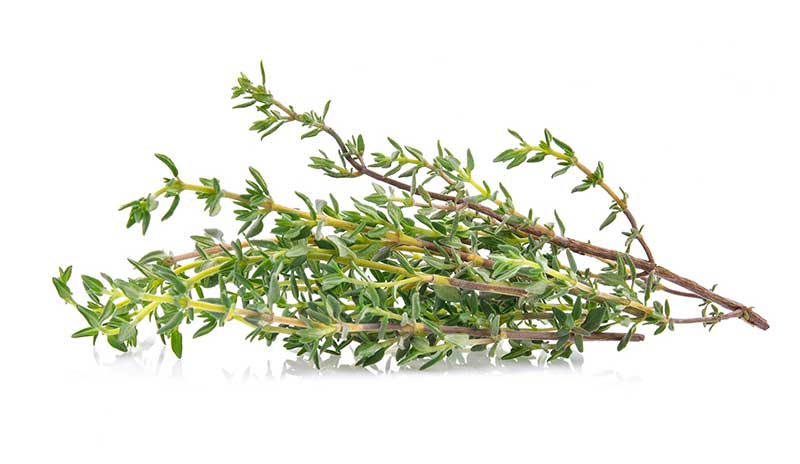 |
| CREDIT: AKEPONG SRICHAICHANA / EYEEM / GETTY IMAGES |
Why It’s So Good: There are many varieties of thyme, but the easiest ones to find are common garden thyme or lemon thyme (Thymus Citriodorus), which has a nice fragrant lemon aroma. Thyme is an all-around immune system booster. Because of its antibacterial, antiviral, and anti-fungal properties, thyme fights off infections and colds. Thyme is also known for calming the nervous system and for easing an upset stomach.
Tips for Growing: You can start from seed or buy a potted plant to get a jump start. You can plant in containers or directly in the soil. Thyme is a hardy plant that likes a decent amount of sun and grows in most climates. Overall, it’s a low-maintenance herb that will grow year after.
Parts Used: Leaves and flowers
How to Use: Add chopped leaves to salads, soups, sauces, and seasoning mixes.
Recipe Idea: The tang of cheddar cheese and gentle herby notes of thyme blend beautifully in these savory Cheddar-Thyme Flaky Biscuits.
6. Tulsi (Holy Basil)
Ocimum Sanctum
Why It’s So Good: Tulsi, known as holy basil or sacred basil, is well-regarded for warding off viral and bacterial infections as well as colds, flu, and sore throats because of its antibacterial and antiviral properties. Tulsi reduces stressors on the body, aids the circulatory system, and also helps with focusing and concentration. Highly regarded in India, this herb is used in a lot of Indian and Asian cuisine, including Thai and Vietnamese.
Tips for Growing: Similar to sweet basil, Tulsi needs a lot of sunlight and thrives in warm and hot weather. You can grow from seed after the chance of frost has passed. Basil grows well in containers.
Part Used: Leaves
How to Use: Clip leaves and incorporate them into your favorite dish or make a recipe, specifically calling for this wonderful herb. Make sure you add Tulsi at the very end so you don’t lose all the flavor. You can also make tea from the leaves.
Where to Buy These Herbs
Seeds and supplies can be purchased online from your local garden center. Additionally, these online seed and garden companies offer a bounty of choices to start your culinary herb garden:
- Botanical Interests seed company specializes in all things for the home gardener.
- Johnny’s Seeds offers an array of seeds and supplies for gardeners and farmers.
- Baker Creek Heirloom Seeds focuses on heirloom seeds and obscure, intriguing, and difficult-to-find varieties.
- Gardeners Supply Company has everything you need to get an herb garden started.
Important Notice: This article was originally published at www.allrecipes.com by Lauren David where all credits are due.
Disclaimer
The watching, interacting, and participation of any kind with anything on this page does not constitute or initiate a doctor-patient relationship with Dr. Farrah®. None of the statements here have been evaluated by the Food and Drug Administration (FDA). The products of Dr. Farrah® are not intended to diagnose, treat, cure, or prevent any disease. The information being provided should only be considered for education and entertainment purposes only. If you feel that anything you see or hear may be of value to you on this page or on any other medium of any kind associated with, showing, or quoting anything relating to Dr. Farrah® in any way at any time, you are encouraged to and agree to consult with a licensed healthcare professional in your area to discuss it. If you feel that you’re having a healthcare emergency, seek medical attention immediately. The views expressed here are simply either the views and opinions of Dr. Farrah® or others appearing and are protected under the first amendment.
Dr. Farrah® is a highly experienced Licensed Medical Doctor certified in evidence-based clinical nutrition, not some enthusiast, formulator, or medium promoting the wild and unrestrained use of nutrition products for health issues without clinical experience and scientific evidence of therapeutic benefit. Dr. Farrah® has personally and keenly studied everything she recommends, and more importantly, she’s closely observed the reactions and results in a clinical setting countless times over the course of her career involving the treatment of over 150,000 patients.
Dr. Farrah® promotes evidence-based natural approaches to health, which means integrating her individual scientific and clinical expertise with the best available external clinical evidence from systematic research. By individual clinical expertise, I refer to the proficiency and judgment that individual clinicians acquire through clinical experience and clinical practice.
Dr. Farrah® does not make any representation or warranties with respect to the accuracy, applicability, fitness, or completeness of any multimedia content provided. Dr. Farrah® does not warrant the performance, effectiveness, or applicability of any sites listed, linked, or referenced to, in, or by any multimedia content.
To be clear, the multimedia content is not intended to be a substitute for professional medical advice, diagnosis, or treatment. Always seek the advice of your physician or other qualified health providers with any questions you may have regarding a medical condition. Never disregard professional medical advice or delay in seeking it because of something you have read or seen in any website, video, image, or media of any kind.
Dr. Farrah® hereby disclaims any and all liability to any party for any direct, indirect, implied, punitive, special, incidental, or other consequential damages arising directly or indirectly from any use of the content, which is provided as is, and without warranties.

